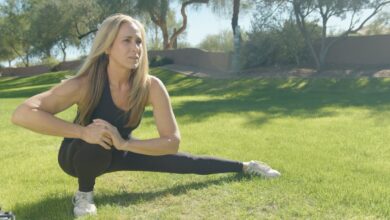The Best Time to Exercise: Morning or Evening?

When it comes to exercise, everyone has their preferred time of day. Some people jump out of bed and hit the gym before the sun rises, while others need a little more time to wake up and prefer an evening workout. But is there an optimal time to exercise? A recent study conducted at Skidmore College sheds some light on this question.
The study, led by Paul J. Arciero, Ph.D., a professor in the health and human physiological sciences department at Skidmore, examined the benefits of morning versus evening exercise for both men and women. Surprisingly, the results showed that men and women respond differently to different types of exercise depending on the time of day.
For women looking to lower blood pressure or reduce belly fat, morning exercise was found to be more effective. On the other hand, women aiming for upper body muscle gains, endurance, or overall mood improvement should consider evening workouts. The findings for men were somewhat flipped: Evening exercise was found to lower blood pressure, reduce the risk of heart disease, and alleviate feelings of fatigue, while morning exercise was more effective for burning fat.
To optimize your workouts, Arciero suggests adjusting your exercise routine based on the time of day when you can achieve the most benefits. For women, this might mean performing cardio workouts in the morning and strength training in the evening.
Another factor to consider is your chronotype, which refers to your body’s natural inclination to sleep at a certain time. Jennifer J. Heisz, Ph.D., an associate professor of kinesiology at McMaster University, emphasizes that the best time to exercise can vary depending on your chronotype. Night owls, for instance, might find it challenging to exercise at night due to early morning commitments that require sufficient sleep.
Regardless of the time you choose to exercise, it is crucial to prioritize sleep. Sleep allows your body to recover and make gains from exercise. Even if research suggests certain exercises are more beneficial at specific times, the results will be compromised if you don’t get enough sleep.
If you’re interested in shifting your workout time to align with the findings of Arciero’s study or to make exercise more convenient, Heisz suggests that both sunlight and exercise can help reset your biological cues. Exercising outside in the morning can be especially effective due to the combined influence of sunlight and physical activity.
For older adults who tend to wake up early and struggle to fall back asleep, evening exercise might be beneficial. Engaging in gentle exercises like yoga can aid in winding down and improving sleep quality. Avoiding vigorous exercise, such as running, close to bedtime can prevent elevated heart rates that make it harder to relax.
Finding a routine that works for you is key. Meghan Cully, a graphic designer from Maryland, incorporates exercise into her evening routine by working out on her way home from work. This approach allows her to unwind and still have ample time to relax in the evening.
Ultimately, regardless of the time you choose to exercise, what matters most is adopting a multi-modal approach. Arciero’s study introduced a program called RISE, which includes resistance training, sprint interval training, stretching, and endurance exercises. Incorporating each type of exercise into your weekly routine can lead to higher compliance and greater benefits.
In conclusion, the best time to exercise depends on your individual goals, chronotype, and lifestyle. By understanding the effects of exercise at different times of the day and tailoring your routine accordingly, you can maximize the benefits of physical activity and optimize your overall well-being.






